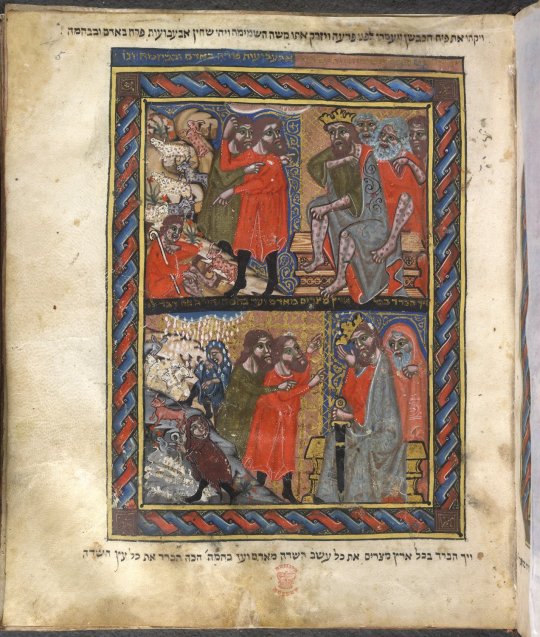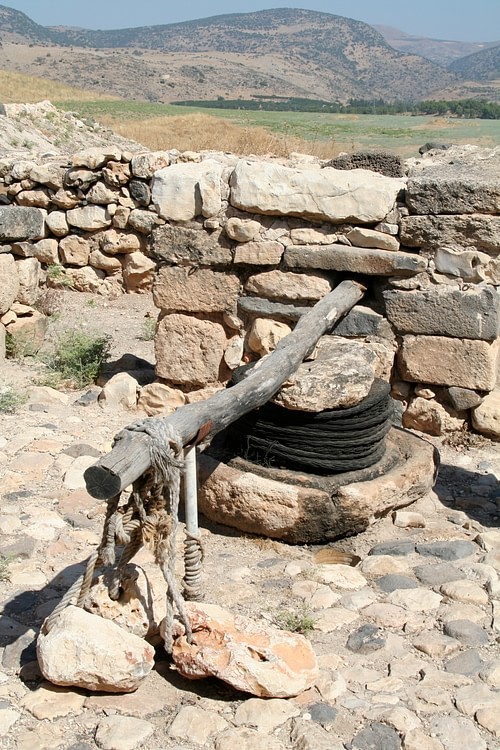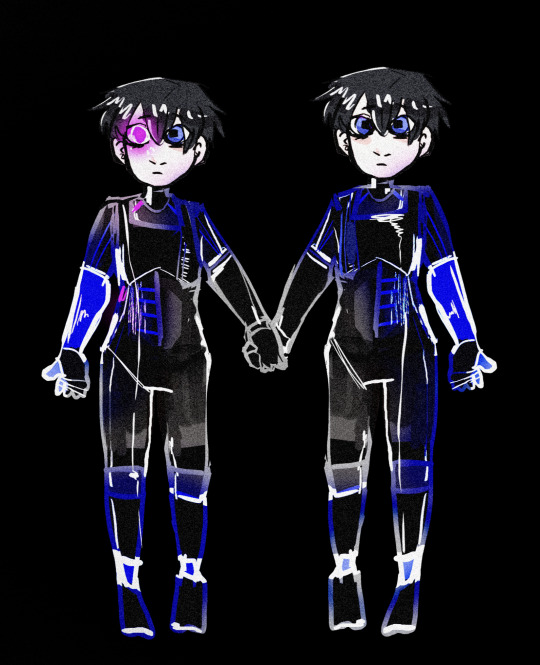#l: hebrew
Text

Folio 5 recto (The 6th & 7th plagues), the Brother Haggadah
#manuscript#illuminated manuscript#brother haggadah#haggadah#c: catalonia#c: shephardi#l: hebrew#y: 1300s#t: page
29 notes
·
View notes
Text
A cool thing about nightblood I have no way to confirm. Hebrews a gendered language, and the hebrew word for sword is femminine, and nightblood will likley be refered to with masculine pronouns. Which means that in the hebrew translation, its likley that both masculine and femminine pronouns will be used for nightblood!
#i have no way to confirm since I am not even sure if warbreaker was translated to hebrew L#warbreaker#the stormlight archive#nightblood
30 notes
·
View notes
Text
Had a dream where I just flirted with girls
#they were so cute#they boyh liked crafts and were making themselves tank tops l#one of them embroidered my shirt for me ans gave me a cherry?#pretty sure i knew her from another dream#the other had a library where i found someones annotated hebrew poema#and the whole dream i was struggling bc i wanted fo date them both
4 notes
·
View notes
Text
.... small private thing here
my mom never believed me that NO ONE can pronounce my (dead) name (she gave me the English version of my name because she thought it'd be easier for Americans/get me less made fun of) but she finally understood yesterday when we went to the doctor together and I either got hit with the Spanish-pronunciation of it or the fucking /Russians/ (OF ALL PEOPLE) thinking my name was French. No one said the English one. Like ma'am, you played yourself, we should have kept it at Ирина and let everyone else get over their xenophobia.
#not bnha#there's a reason I just went with my hebrew name for years it's easily sayable for everyone#immigrant parents taking the L
5 notes
·
View notes
Text
This is a developing news story and may be updated as more information is obtained. If you value such information, please support this Substack.
On Dec. 1, a woman immolated herself with a Palestinian flag outside the Israeli consulate in Atlanta.
Now, according to the Atlanta Fire Rescue Department, the woman — referred to in their report as “Jane Doe” — is alive and “in stable condition” at Grady Memorial Hospital, where she has been since the immolation.
After repeated requests for her name, the department stated to this reporter in an email that it “does not disclose the identities of victims”. Repeated inquiries to Grady, which is a public hospital, went unanswered. The hospital houses the Walter L. Ingram Burn Center.
“Jane Doe” is 27.
When asked if they had made any comment to tell the public that she was still alive this entire time, the official at Atlanta Fire Rescue Department said they “shared the last updated with local media via email on 12/21/23. The release stated: ‘The victim remains hospitalized in critical condition. The security guard, who attempted to assist the burn victim, has been released from the hospital.’” Several internet searches on that quote produce no results. This would also indicate that "Jane Doe" went from critical to stable condition without public notice.
Aaron Bushnell immolated himself at the Israeli embassy in Washington, D.C. on Sunday, explaining “I will no longer be complicit in genocide” and shouting “Free Palestine!” repeatedly as he burned alive. So, his case — unlike many other self-immolations including Gregory Levey, Raymond Moules, Timothy T. Brown, Malachi Ritscher and others — has received some attention. Thus, “Jane Doe” being ignored fits with the usual pattern. Bushnell is the exception — probably because he livestreamed it. See “Ignoring Immolators Lulls the Society to Sleep.”
As Bushnell was burning himself alive, an officer pointed a gun at him, barking orders as if he constituted a threat. A security guard, Michael Harris, sustained injuries working to rescue “Jane Doe” — but there were similarities, where she was actually viewed as a potential threat.
At one point, the police report for “Jane Doe” refers to it as being a case of “arson”.
Much of the media coverage and general discussion of her self-immolation in December focused on if she had done damage. The Atlanta Police Chief said: “We believe this building remains safe, and we do not see any threat here.” The Israeli government released a statement: “It is tragic to see the hate and incitement toward Israel expressed in such a horrific way.”
Police records indicate that they obtained a search warrant and entered an apartment they believed to be associated with “Jane Doe” — initially using a drone:
The drone was able to relay information as to the layout and the belongings inside. After it was deemed "safe" entry was made with bomb technicians. While clearing the apartment no improvised explosive devices were located.
The police report also noted:
During the search a Quran was found in the bedroom along with a [sic] Arabic dictionary and a Hebrew dictionary. The bedroom bookshelf contained books related to fiction and fantasy. A "Drug use for grown ups" book was on the bookshelf as well.
Two journals were seized from the bedroom. A thumbdrive was seized from the bedroom as well. A laptop computer was seized from the kitchen counter. A copy of the search warrant was left in the living room of the apartment. The front door [of] the apartment was secured before law enforcement left the premises.
When pressed for more information in compliance with an Open Records Request under Georgia law, Atlanta Fire Rescue Department claimed: “There is an ongoing and active investigation for the incident in question, which is why the only releasable information has been shared via the incident report. Investigative documentation is not available for release until the investigation is closed.”
7K notes
·
View notes
Text










2/9/23-Moth trap, other insects, birds and plants at home
Photos taken in this set: 1. Small Blood-vein moth, one I know well. 2. Setaceous Hebrew Character, one I had in my room in 2019 which I remember fondly a striking moth which I am very pleased to see today. 3. A gorgeous Treble-bar, one I saw at Blashford Lakes in 2021 it was a pleasure to see my first at home. 4. Another seen today that I recall from a sighting at home in 2021, L-album Wainscot a very fascinating and beautiful moth. 5. A Tapered Drone fly which it was a treat to see in the garden when home this evening. 6. Pretty sunflower in the morning light in the garden. 7. Square-spot Rustic. 8. A little moth. 9. Some pink geraniums in the garden before going out this afternoon, it's great to see these out after seeing them on their way last weekend. 10. My first ever Gold Triangle moth, an appealing one to see my 90th ever identified moth species in my life which was nice to reach.
Also in the moth trap were Large and Lesser Yellow Underwing and Vine's Rustic again, Double-striped Pug a favourite of mine, Morning-glory Plume moth, Box Tree moth, Shuttle-shaped Dart again a great one that I learnt on Tuesday and possibly a Light Brown Apple moth. I enjoyed doing a moth trap again, this new activity we've indulged in this week certainly has that exciting unknown opening presents on Christmas morning feel about it. I saw another hoverfly in my room this evening, and enjoyed buddleia, skimmia coming into flower, sedum, fuchsia and other flowers. I felt extremely lucky to hear and see closely Blue Tit in the garden this morning, with Goldfinch, Collared Dove, Starling heard and Small White butterfly seen from home other highlights.
#l-album wainscot#double-striped pub#square-spot rustic#setaceous hebrew character#lesser yellow underwing#large yellow underwing#moths#uk#morning-glory plume moth#gold triangle moth#shuttle-shaped dart#photography#macro#tapered drone fly#blue tit#birdwatching#world#home#saturday#weekend#2023#europe
1 note
·
View note
Text
fruit roll-ups
#my most prominent memory of sunday school is snacktime bc it was the only place id get to eat these and also fruit gushers#and my most prominent memory of hebrew school is watching jibjab videos on the library computer before class started#turns out kids are more interested in sugary snacks and having fun. big L for religion 😔
0 notes
Note
Hello, I read your (and Terry Pratchett's) book "good omens", and i wanted to ask you something. My native language is Hebrew, and so I read the book in that language. I wanted to ask what is the right way to pronounce Aziraphale's name. In Hebrew, it's written "Azir'fa'el". I checked other languages that I'm familiar with, and in Spanish it's written "Azirafel", and in Japanese it's written "Azirafe-l" (the - symbolizing elongated pronunciation). I would love it if you could respond, Ene.
Pronounce it the way that seems right to you in your language.
1K notes
·
View notes
Text
By the way.
I saw someone bring up awhile ago that all the people all snottily being “isnotreal” clearly do not know Hebrew or how to pronounce Israel, and they’re mocking us and our language. The same people, ironically, were getting mad about people saying “Izzlom” and “Muzzlum” a few years ago. They were correct in that instance, if you know better you should do better, but they’ve forgotten their own values of diversity.
So if you want to NOT be that person, here’s how you say “Israel” in English. (In Hebrew it’s actually Yisrael.)
FIRST SYLLABLE: represented in English by “Is,” is pronounced the same as the end of “kiss” or “miss.”
SECOND SYLLABLE: represented in English by “ra,” is more easily demonstrated. Imagine you’re saying the word “rye” and halfway through a dentist puts a stick on your tongue and turns it into an “ah.” It’s kind of like that. It also has a hard stop—there is no diphthong between the second and third syllables.
THIRD SYLLABLE: takes the stress (israEL). Is pronounced exactly like the English letter L.
So It’s not “izz-real,” it’s iss-rah-EL. As one might expect of a Semitic language, because weirdly enough, we’re not fucking lying about being a Middle Eastern people.
260 notes
·
View notes
Text
One of the worst justifications for the Hamas massacre that I have seen is the idea that the Palestinians had been suffering for 75 years, and such a long period of suffering is what made them be so brutal towards the civilians in the Jewish state.
This ignores, of course, brutal massacres that happened way before decades had passed since Israel's Independence War (which the Arabs started and lost). One such massacre took place on March 17, 1954. Less than five years after the end of that war. The other day, we commemorated 70 years since it happened. In order to remember, one reporter interviewed a survivor.
The entire piece was too long for Tumblr even after I downgraded the vid quality, so I edited out parts that were less relevant to understanding the massacre, and the story of this one child survivor.
Translator's notes:
-> Chaim'keh is the affectionate diminutive for Chaim, Mira'leh is the same for Miri.
-> In another interview, Miri shared that the reason her dad was taking them to Eilat, was because he wanted them to move to Israel's most southern city, meaning he felt Chana and the kids should see it.
-> This is the Ma'ale Akrabim road, you can see how serpentine it is, and the bus was driving uphill, explaining why it had to slow down so much that it became a perfect target for the terrorists.

-> 'Confirmation of killing' is a military term, referring to any situation where after shots have been fired at someone, the shooter comes closer and shoots (or wounds) again, from a much smaller distance, to make sure the victim is indeed dead, and not just wounded.
-> Chaim was shot in the head point blank, but somehow he technically survived. However, he was left in a coma for the next 32 years, before passing away and becoming the final murdered victim of this massacre.
-> Excluding Chaim, but including Miri, 5 people survived the Ma'ale Akrabim massacre.
-> Ha'Shomer Ha'Tzair (Hebrew for: the young guardian) is the first Zionist youth movement, established in 1913. It's also a socialist one.
-> A chuppah is a canopy under which Jewish couples get married.
-> Sayeret Matkal is an elite Israeli unit, whose most well known operation is the 1976 IDF rescue of Israeli and Jewish hostages (all the non-Jewish hostages were released, other than the French air crew of the hijacked Air France airplane, because the Captain refused to leave the Israeli and Jewish hostages on their own. The kidnappers were 2 German terrorists and 2 Arab ones who were members of a Palestinian terrorist organization. The Israeli and Jewish hostages were held in an airport in Entebbe, capital of Uganda, that the terrorists believed the IDF couldn't reach, since the distance was greater than Israel's airplanes could fly to and back, and passed over enemy territory. Several movies have been made about the operation, including an Israeli one, which was nominated for an Oscar, for best foreign film, in 1977).
-> Z"l is the English transcription of the Hebrew abbreviation ז"ל, which stands for may his/her/their memory be a blessing.
(for all of my updates and ask replies regarding Israel, click here)
#israel#antisemitism#israeli#israel news#israel under attack#terrorism#anti terrorism#hamas#antisemitic#antisemites#jews#jew#judaism#jumblr#frumblr#jewish#resources#israel under fire#israelunderattack
121 notes
·
View notes
Note
For a school assignment, I'm assembling an anthology around the theme of queer divinity and desire, but I'm having a hard time finding a fitting essay/article (no access to real academic catalogues :/ ), do you know of any essays around this theme?
below are essays, and then books, on queer theory (in which 'queer' has a different connotation than in regular speech) in the hebrew bible/ancient near east. if there is a particular prophet you want more of, or a particular topic (ištar, or penetration, or appetites), or if you want a pdf of anything, please let me know.
essays: Boer, Roland. “Too Many Dicks at the Writing Desk, or How to Organize a Prophetic Sausage-Fest.” TS 16, no. 1 (2010b): 95–108. Boer, Roland. “Yahweh as Top: A Lost Targum.” In Queer Commentary and the Hebrew Bible, edited by Ken Stone, 75–105. JSOTSup 334. Cleveland, OH: Pilgrim, 2001. Boyarin, Daniel. “Are There Any Jews in ‘The History of Sexuality’?” Journal of the History of Sexuality 5, no. 3 (1995): 333–55. Clines, David J. A. “He-Prophets: Masculinity as a Problem for the Hebrew Prophets and Their Interpreters.” In Sense and Sensitivity: Essays on Reading the Bible in Memory of Robert Carroll, edited by Robert P. Carroll, Alastair G. Hunter, and Philip R. Davies, 311–27. JSOTSup 348. Sheffield: Sheffield Academic Press, 2002. Graybill, Rhiannon. “Yahweh as Maternal Vampire in Second Isaiah: Reading from Violence to Fluid Possibility with Luce Irigaray.” Journal of feminist studies in religion 33, no. 1 (2017): 9–25. Haddox, Susan E. “Engaging Images in the Prophets: Feminist Scholarship on the Book of the Twelve.” In Feminist Interpretation of the Hebrew Bible in Retrospect. 1. Biblical Books, edited by Susanne Scholz, 170–91. RRBS 5. Sheffield: Sheffield Phoenix Press, 2013. Koch, Timothy R. “Cruising as Methodology: Homoeroticism and the Scriptures.” In Queer Commentary and the Hebrew Bible, edited by Ken Stone, 169–80. JSOTSup 334. Cleveland, OH: Pilgrim, 2001. Tigay, Jeffrey. “‘ Heavy of Mouth’ and ‘Heavy of Tongue’: On Moses’ Speech Difficulty.” BASOR, no. 231 (October 1978): 57–67.
books: Ahmed, Sara. Queer Phenomenology: Orientations, Objects, Others. Durham, NC: Duke University Press, 2006. Bauer-Levesque, Angela. Gender in the Book of Jeremiah: A Feminist-Literary Reading. SiBL 5. New York: P. Lang, 1999. Black, Fiona C., and Jennifer L. Koosed, eds. Reading with Feeling : Affect Theory and the Bible. Atlanta, GA: SBL Press, 2019. Brenner, Athalya. The Intercourse of Knowledge: On Gendering Desire and “Sexuality” in the Hebrew Bible. BIS 26. Leiden: Brill, 1997. Camp, Claudia V. Wise, Strange, and Holy: The Strange Woman and the Making of the Bible. JSOTSup 320. Gender, Culture, Theory 9. Sheffield: Sheffield Academic Press, 2000. Chapman, Cynthia R. The Gendered Language of Warfare in the Israelite-Assyrian Encounter. HSM 62. Winona Lake, IN: Eisenbrauns, 2004. Creangă, Ovidiu, ed. Men and Masculinity in the Hebrew Bible and Beyond. BMW 33. Sheffield: Sheffield Phoenix Press, 2010. Eilberg-Schwartz, Howard. God’s Phallus: And Other Problems for Men and Monotheism. Boston: Beacon, 1995. Huber, Lynn R., and Rhiannon Graybill, eds. The Bible, Gender, and Sexuality : Critical Readings. London, UK ; T&T Clark, 2021. Guest, Deryn. When Deborah Met Jael: Lesbian Biblical Hermeneutics. London: SCM, 2005. Graybill, Rhiannon, Meredith Minister, and Beatrice J. W. Lawrence, eds. Rape Culture and Religious Studies : Critical and Pedagogical Engagements. Lanham, Maryland: Lexington Books, 2019. Graybill, Rhiannon. Are We Not Men? : Unstable Masculinity in the Hebrew Prophets. New York, NY: Oxford University Press USA, 2016. Halperin, David J. Seeking Ezekiel: Text and Psychology. University Park: Pennsylvania State University Press, 1993. Jennings, Theodore W. Jacob’s Wound: Homoerotic Narrative in the Literature of Ancient Israel. New York: Continuum, 2005. Macwilliam, Stuart. Queer Theory and the Prophetic Marriage Metaphor in the Hebrew Bible. BibleWorld. Sheffield and Oakville, CT: Equinox, 2011. Maier, Christl. Daughter Zion, Mother Zion: Gender, Space, and the Sacred in Ancient Israel. Minneapolis, MN: Fortress, 2008. Mills, Mary E. Alterity, Pain, and Suffering in Isaiah, Jeremiah, and Ezekiel. LHB/OTS 479. New York: T. & T. Clark, 2007. Stökl, Jonathan, and Corrine L. Carvalho. Prophets Male and Female: Gender and Prophecy in the Hebrew Bible, the Eastern Mediterranean, and the Ancient Near East. AIL 15. Atlanta, GA: SBL, 2013. Stone, Ken. Practicing Safer Texts: Food, Sex and Bible in Queer Perspective. Queering Theology Series. London: T & T Clark International, 2004. Weems, Renita J. Battered Love: Marriage, Sex, and Violence in the Hebrew Prophets. OBT. Minneapolis, MN: Fortress, 1995.
86 notes
·
View notes
Text
Learn your Bible don’t just read it.
Reasons:
1.Value of his word
His words, his love will pop up for you when you struggle, when you’re about to sin, after you sin, and when you behave righteous. It works with the Holy Spirit it’s a constant and encouraging advocate.
2. Spiritual warfare
You can use it. When he says that he is NOT JOKING. Your thoughts will bend and leave at his name. It’s hard it takes effort and repetition will save you.
3. Taken out of context
One of the biggest I’ve seen these days is people taking the Bible out of context to twist God into some cruel maniac. If you know your Bible and you knwo the full context..they can’t cause doubt. It’s easy to look at the story if God taking the first born son of the household of Egypt and go “that’s cruel and unnecessary he must be evil” until you know the context. That he has given multiple other chances and that he was literally freeing his people from slavery.
Learn it, know it, love it.
Oh yeah and also RESEARCH IT look toward usage l, what did that word mean in Hebrew or Greek? What’s the significance? Is this story literal or metaphorical?
Proverbs 25: "It is the glory of God to conceal a matter; to search out a matter is the glory of kings."
#christian blog#christian faith#christianity#jesus christ#jesus#christanity#love#christian#god#christian encouragement
38 notes
·
View notes
Text
As promised, I will explain the Hallelujah thing.
So the word is actually a composite word, in that it is made up of "hallel" and "Yah." The latter is one of the better known names of G-d (and for this reason some traditional Jews won't say the whole word of hallelujah outside of prayer or religious study) but the former deserves a little more investigation. A simple translation of it is "praise" or "glory," and so most translations of this into English are fairly faithful to the Hebrew.
However, I think knowing the context adds some shades of meaning to it that are important. Hallel in Hebrew is spelled הלל (hay-lamed-lamed) or (effectively) H-L-L. Written Hebrew doesn't include vowels (unless they are added in using the pointed Hebrew system) so the word written out traditionally would read: HLL, despite (obviously) being pronounced with the vowel sounds. It is for this reason that I'm not terribly a fan of the linguistic drift of "alleluia," because it drops the hay/ה sound at the beginning, which is very important to the word being legible and diminishes the name of G-d at the end by denoting it using a common suffix. It also means that the people saying it almost certainly do not know the origin of the word and the root word Hallel.
In any event, it's worth noting that there are a number of words in Hebrew that refer to praise (especially in a religious context) but this one specifically refers to the Psalms (Tehillim), which share a root in Hebrew.
To say Hallel is to say Tehillim - specifically Psalms 113 - 118. These are typically sung with a lot of ruach (spirit) and joyful melodies, and are reserved for happy occasions. This is one reason why I find the fact that we daven Hallel for Av, the saddest month on the Jewish calendar, when we intentionally lessen our joy upon starting it, so compelling and so Jewish. (More on that here.)
Hallel isn't just praise. It's Psalms sung from the heart, from a place of joy and resilience.
#anyway Shabbat shalom#chag sameach#thanks for coming to my drash 😂#every hour is theology hour around here apparently#there's also a drash in there about how the ''Yah'' name carries the feminine ending of ה#and how Hallel is sung for Rosh Chodesh#and how Hallel is a feminine Jewish name#so hallelujah is a feminine spiritual word in many ways#but it's too close to yontiff to tease that out
126 notes
·
View notes
Photo

Ancient Israelite Technology
Technology enabled ancient Israel, the Northern Kingdom excluding Judah, to be economically prosperous and establish itself as a major political power as early as the 10th century BCE, steadily growing until its destruction in 720 BCE. Some of the most important technologies evident in archaeological and literary records include, though are certainly not limited to, construction and architecture, writing, industrial tools, and weapons of war.
As ancient Israelite technology here is presented primarily from the historical timeline as derived from archaeology, not the Hebrew Bible, the chronology suggested by Z. Herzog and L. Singer-Avitz will be used. Likewise, for the sake of this definition, “Israel” and “ancient Israel” refer to what is traditionally called the Northern Kingdom, while “Judah” refers to what is traditionally called the Southern Kingdom, with reference to the Hebrew Bible. “Israelite” or “Samarian”- Samaria being the capital of ancient Israel - and “Judean” or “Judahite” refer to the people of Israel and Judah respectively.
Technology in Israel Between the 13th and 11th Centuries BCE
The earliest mention of Israel appears in the Merneptah stele, which suggests that all the Israelites were killed. This was likely Egyptian propaganda. Even so, archaeological evidence for Israelites in this region as a unique ethnicity is lacking during this period. Therefore, is too hypothetical to discuss Israel's technology prior to the 10th century BCE.
Continue reading...
28 notes
·
View notes
Text
CW: mild body horror



so this is my AI AU...i dont have all of the pieces done yet, but I think this will be part one of 3 little collages I'm going to make hehe...the basic summary of the AU is, What if Black Butler BUT ROBOTS????
R!Ciel and O!Ciel are a pair of extremely intelligent bots made by the company Angel Wing (a company trying to put human sentience into robots to specifically help prolong the lives of sick children). The two of them are called RCL and OCL (R-C-L, O-C-L, pronounced just as you'd pronounce r!ciel and o!ciel, since it's cee el) and they're the newest little toy...
That is, until RCL goes missing from their little padded cell of monitored stimulation and information learning. And, then, a strange nebulous 'virus' infects OCL. Suddenly, he's on the run -- or rather, something is running and he's in their arms!!
Sebastian Michaelis (nicknamed, The Daemon, because he almost exclusively codes in hebrew and it looks Very Intimidating) had his eye on these little bots (called: dolls). He wants to know the true depth of their humanity, whether or not they actually 'have a soul' or if its a big hoax. Consider that a morbid curiosity of his. And so by hacking the mainframe of the company and infiltrating, he's finally able to extrapolate what's going on...
Kinda.
Anyway, while they're on the run, they have to crash at the fantastic transgender catgirl hacker (a very common trope, I know) Grelle's bachelorette pad.
details i can't fit in
OCL is 4'4, RCL is 4'5, they're quite a bit smaller and lighter since they're hypertech robots
They can't walk on their own for very long, their legs are functional but they were not designed for that
OCL...um....can bleed. something. something is going on. they're not really sure what he is.
He doesn't remember anything either
Sebastian's current hacker name is DOG because him and Grelle had a kitty motif for a while, but then he lost a bet. At the end of the month hes nerfing his account (like he'd even last that long before being caught)
characters that are important and WILL show up later: Alois, Jim, Claude, Undertaker, Ash, other important ones
something bad happened to RCL. OCL cannot remember it, though :(
no grelle's ears are not real. its a headband for the aesthetic. shes in her playful era. its between the 50 different shades of crimson eras
I've been calling this thing Cosmo Circuits. If you even care
#Cosmo Circuits#black butler au#sebastian michaelis#ciel phantomhive#r!ciel#o!ciel#grelle sutcliffe#grell sutcliff#ai au
103 notes
·
View notes
Text
Aššum šer’ānīm wēdūtim- Concerning a single sinew
Šarrum ilput u bēlīšu īšbī- That a king touched and his lord was satisfied
Adīni bēlī narūtī lā išemme - But until now my lord hears not my musician’s craft
I nīš tūhrī, u išartu- The rise of the tuhru, the normal (akkadian music terminology)
Embūbu, kitmu, u pitū- Wind-pipe, closed, open (akkadian music terminology)
Šarrum wēdum luktarabka uzammer- A lonely king singing Luktarabka
Luktarabka, Luktarabka, Luktarabka- May I praise him forever, may I praise him forever
Luktarabka- May I praise him forever.
Ikrībka uddanninū- Your prayers strengthened,
Eli kīrīša ūtellil tāmurši - In her garden purifying herself you saw her,
Šapliš warḫim kuzūbša īlte’īka- Under the new moon her sexual vigor was more powerful than thee,
Ana kussīka šī iṣmidka, napištaka iḫpi, u mālīka- To your throne she yoked you, she broke your throat and cut your hair,
Ibtuq, u luktarabka ušassīka- And she made you cry out Luktarabka
Luktarabka, luktarabka, luktarabka- May I praise him forever, may I praise him forever
Luktarabka - May I praise him forever
Šumaka taqbi ušalpissu- You said I desecrated your name,
Šumaka ula īdēšu- I do not know your name,
U šumma eddīšu aqbi, lā tanakker - And if I said I knew it, do not become hostile,
Ēma qibiātim nannaratam- Wherever there is utterance there is light,
Šumma tešme, ittappaḫ,- If thou heard, it shines,
Elletum u šebirtum luktarabka- The holiness or the brokenness luktarabka,
Luktarabka, luktarabka, luktarabka- May I praise him forever, may I praise him forever
Luktarabka - May I praise him forever
Narāmī, annīkiam attallak- My love, I went here repeatedly
Kummī šunutī alammad- I know these chambers,
Ina ramāni ušib, lāma alammadki- I used to dwell alone before I knew you,
Adīni kunukakki ammar- I’ve seen your seal,
Adi bīt igārim, palāḫum ir- On the temple wall, worship,
-nittam ul imaṣṣīšu, luktarabka- does not equal victory, luktarabka,
Luktarabka, Luktarabka, Luktarabka- May I praise him forever, may I praise him forever,
Luktarabka- May I praise him forever.
Pīqat elēnunī ilam- Perhaps above us is a god,
Aššum ru’āmim, adīni tuppātim kališina- But concerning love, until now all the tablets
Iqabbiānim, aššum ana dakum awilīī- taught me, concerned the killing of men,
Šasûm ina mušiātim ul tešemme- It is not crying out by night you hear,
Awilum nannaram ul īmur- Nor a man who saw the light,
Ina Bābilim ša la hallelujah,.. In Babylon there is only Hallelujah.
Hallelujah, Luktarabka, Luktarabka- May I praise him forever, may I praise him forever,
Luktarabka- May I praise him forever.
I finally did it. Leonard Cohen’s Hallelujah, translated into Akkadian (Ancient Babylonian).
“Hallelujah” itself is not a single word in the original Hebrew, it’s a verbal phrase- Praise Yah, the imperative of the verbal root h-l-l, rendered in the second person masculine plural. The same verbal root exists in Akkadian with the initial H dropped, as alālum, to sing, but I couldn’t find a verbal form that scanned well with the tune. Instead I went for a form of the verb karābum, meaning to bless/pray/praise. In the precative tense and GT stem- “Luktarabka”, roughly translatable as “May I praise thee continually/eternally”, which I felt captured the meaning of both the original phrase and its place in the song.
I’d toyed with the idea of this translation for a long time, but put it off, partially because of the third and fourth lines. Then I discovered this paper, a study and analysis of a surviving cuneiform tablet of instructions for tuning a stringed instrument. The instructions are not fully understood even by experts, and I don’t know enough music theory to reconstruct “the minor fall, the major lift” exactly. But I did use the names that appear to be given to the individual chords or strings of the instrument in the third and fourth lines- nish tuhri, ishartu, embubu, nidi wabli, qablitu, kitmu, pitu. It appears the components of the instrument may have been named after animal body-parts, conceptualising the entire harp as a living animal working in tandem with itself.
190 notes
·
View notes